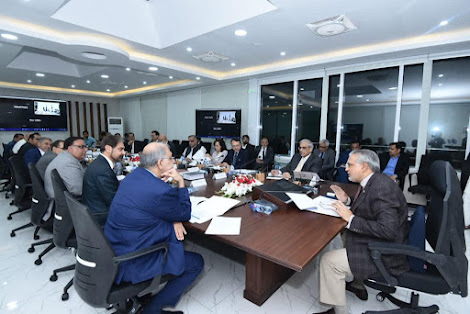
Finance Minister Shaukat Tarin Thursday said self-reliance was the only way forward for Pakistan to achieve economic stability and lessen dependence on revenue streams flowing in from donor agencies.
“As long as these revenue streams flow, things work well but once these streams go away, problems re-surface and economic independence becomes a distant dream,” he said in a keynote address to a two-day ‘Conference on Value Added Tax (VAT)’ that started in the capital here under the auspices of Federal Board of Revenue (FBR).
The minister said Pakistan heavily relied on taxes as a major source for government revenues required for socio-economic uplift of the people. Optimum revenues are achieved when an efficient taxation system is in place. Our Government’s vision and strategy of a better Pakistan also rests on a taxation régime which is based on equity and fairness, convenience of payment, economy in collection, and simplicity of procedures, he added.
He said reducing poverty through generating additional revenues is an important step towards achieving our government’s vision and that can only be achieved through an efficient taxation system which conforms to the best international practices in revenue collection.
Shaukat Tarin said these best practices were being adopted by countries all over the world and like others Pakistan had also set about modernising its taxation structure through the Tax Administrative Reforms Program (TARP) aimed at achieving greater efficiency and productivity in the tax collecting business processes and tapping new tax resources.
He admitted there were challenges in the way of generating additional indigenous revenues and exercise of discretionary powers by the government, lack of professionalism due to an inadequate capacity building and existence of certain exemptions in our tax regime were issues which needed to be addressed before the introduction of Value Added Tax.
Tarin said the tax managers alone could not do all this and “a lot depends on the policy, planning, vision and commitment of the political and economic managers”. “It is therefore a common responsibility of all the stakeholders to contribute towards achieving an efficient taxation system which can generate additional revenues for the country,” he added.
He also called for collective efforts to achieve a broader and larger goal of better standards of living for the people through better tax collection. This in turn requires increase in tax base by incorporating maximum categories of services into the tax net. While our tax base includes a wide range of goods, services sector, which is a major source of revenue around the world, is largely out of the tax net and it is time we revisited our exemptions, zero-rated items, rate variations and major sources of irritants to business, he added.
The finance minister said Pakistan could also draw on the experiences of other countries for developing a viable model best suited to our economy. He said the Value Added Tax could be considered as an effective tool for proper documentation of economy, widening of tax base and equitable taxation mechanism.
Later talking to media men, Shaukat Tarin highlighted the importance of value addition for taxation purposes on the retail stage as widening of taxation base. At the retail stage it is basically the issue of understanding and tapping the whole supply chain of goods and services. However, enforcement of any such tax on such a stage cannot be adequately done if the tax collecting machinery is not properly aware of the facts and figures regarding the different social segments, documentation of small to medium businesses, their supply chains and financial capacity of the retailers themselves. All this needs to be thoroughly researched, properly documented and comprehensively digitized by the tax machinery.
To another question, he underscored the VAT service delivery and its impact on the lives of our taxpaying community which is the backbone of our economy. FBR should keep in mind that VAT in today’s world is considered as a powerful tool in harnessing funds in domestic markets. These funds can then be used by the developing countries like Pakistan to meet the challenges like increasing mass education, poverty eradication and provision of socio-physical infrastructure.
The minister cited the example of Sri Lanka which at a 15 per cent VAT had been able to increase its tax-to-GDP ratio by seven per cent and if Pakistan could increase its tax-to-GDP ratio by four per cent through the implementation of VAT, it would be able to raise an additional Rs 600 billion, taking us close to bridging the Rs 722 billion fiscal deficit.
Earlier FBR Chairman Mr Sohail Ahmad in his address to the inaugural technical session of the conference highlighted the steps taken by FBR for generating more revenue through massive reforms, re-structuring and business process re-engineering which he said could also serve in the implementation of VAT from July 2010.
He said the government believed the impact of taxes generated through VAT would be significant in covering all those sectors which earlier enjoyed exemptions in one way or the other. He welcomed the participants of the conference which he hoped would be able to come up with a way forward for the implementation of value added tax in an incentive-based, transparent and harassment-free environment.








